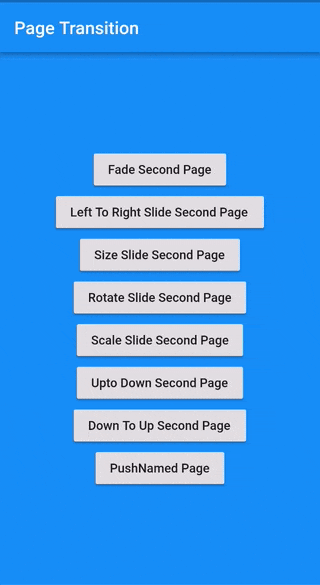Flutter Page Transition Package
This package gives you beautiful page transitions.
Demo
Usage
It is really easy to use!
You should ensure that you add the page_transition as a dependency in your flutter project.
dependencies:
page_transition: "^2.1.0"Would you prefer a video tutorial instead? Check out (Johannes Milke's tutorial) [https://www.youtube.com/watch?v=q-e5t3qnB_M&t=1s]
Than you can use it with below examples.
Navigator.push(context, PageTransition(type: PageTransitionType.fade, child: DetailScreen()));
Navigator.push(context, PageTransition(type: PageTransitionType.leftToRight, child: DetailScreen()));
Navigator.push(context, PageTransition(type: PageTransitionType.rightToLeft, child: DetailScreen()));
Navigator.push(context, PageTransition(type: PageTransitionType.rightToLeft, child: DetailScreen(), isIos: true));
Navigator.push(context, PageTransition(type: PageTransitionType.topToBottom, child: DetailScreen()));
Navigator.push(context, PageTransition(type: PageTransitionType.bottomToTop, child: DetailScreen()));
Navigator.push(context, PageTransition(type: PageTransitionType.scale, alignment: Alignment.bottomCenter, child: DetailScreen()));
Navigator.push(context, PageTransition(type: PageTransitionType.size, alignment: Alignment.bottomCenter, child: DetailScreen()));
Navigator.push(context, PageTransition(type: PageTransitionType.rotate, duration: Duration(second: 1), child: DetailScreen()));
Navigator.push(context, PageTransition(type: PageTransitionType.rightToLeftWithFade, child: DetailScreen()));
Navigator.push(context, PageTransition(type: PageTransitionType.leftToRightWithFade, child: DetailScreen()));
Navigator.push(context, PageTransition(type: PageTransitionType.leftToRightJoined, child: DetailScreen(), childCurrent: this));
Navigator.push(context, PageTransition(type: PageTransitionType.rightToLeftJoined, child: DetailScreen(), childCurrent: this));
Navigator.push(context, PageTransition(type: PageTransitionType.topToBottomJoined, child: DetailScreen(), childCurrent: this));
Navigator.push(context, PageTransition(type: PageTransitionType.bottomToTopJoined, child: DetailScreen(), childCurrent: this));
Navigator.push(context, PageTransition(type: PageTransitionType.leftToRightPop, child: DetailScreen(), childCurrent: this));
Navigator.push(context, PageTransition(type: PageTransitionType.rightToLeftPop, child: DetailScreen(), childCurrent: this));
Navigator.push(context, PageTransition(type: PageTransitionType.topToBottomPop, child: DetailScreen(), childCurrent: this));
Navigator.push(context, PageTransition(type: PageTransitionType.bottomToTopPop, child: DetailScreen(), childCurrent: this));
Usage for predefined routes
First, define the onGenerateRoute property in the MaterialApp widget like below and in switch cases you can transition to your new routes:
onGenerateRoute: (settings) {
switch (settings.name) {
case '/second':
return PageTransition(child: SecondPage(), type: PageTransitionType.scale);
break;
default:
return null;
}
},After that you can use your new route like this:
Navigator.pushNamed(context, '/second');Usage predefined routes with RouteSettings
First, define the onGenerateRoute property in the MaterialApp widget like below and in switch cases you can transition to your new routes:
onGenerateRoute: (settings) {
switch (settings.name) {
case '/second':
return PageTransition(
child: SecondPage(),
type: PageTransitionType.scale,
settings: settings,
);
break;
default:
return null;
}
},After that you can use your new route like this:
Navigator.pushNamed(context, '/second', arguments: "arguments data");for more detail you can look example project.
Usage routes with Inherited Theme
set ctx with BuildContext. ctx mandatory when inheritTheme set to true
Navigator.push(
context,
PageTransition(
type: PageTransitionType.rightToLeft,
child: TargetPage(),
inheritTheme: true,
ctx: context),
);Do you want use theme transitions ?
set type to PageTransitionType.theme and you will use your own theme transitions.
Navigator.push(
context,
PageTransition(
type: PageTransitionType.theme,
child: TargetPage(),
),
);
### Usage routes with IOS Swipe Back
set `isIos` to `true`
```dart
Navigator.push(
context,
PageTransition(
type: PageTransitionType.rightToLeft,
child: TargetPage(),
isIos: true,
),
);Note: IOS swipe back can only use for rightToLeft and fade transition
Types of transitions
- fade
- rightToLeft
- leftToRight
- topToBottom
- bottomToTop
- scale (with alignment)
- rotate (with alignment)
- size (with alignment)
- rightToLeftWithFade
- leftToRightWithFade
- leftToRightJoined
- rightToLeftJoined
- topToBottomJoined
- bottomToTopJoined
- leftToRightPop
- rightToLeftPop
- topToBottomPop
- bottomToTopPop
Curves
You can use any type of CurvedAnimation curves.
Alignments
You can use size, scale and rotate transform alignment
Contributing
Pull requests are welcome. For major changes, please open an issue first to discuss what you would like to change.
Please make sure to update tests as appropriate.



